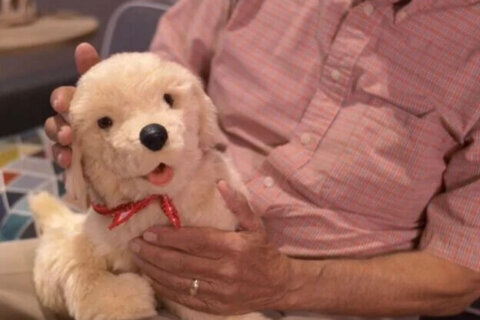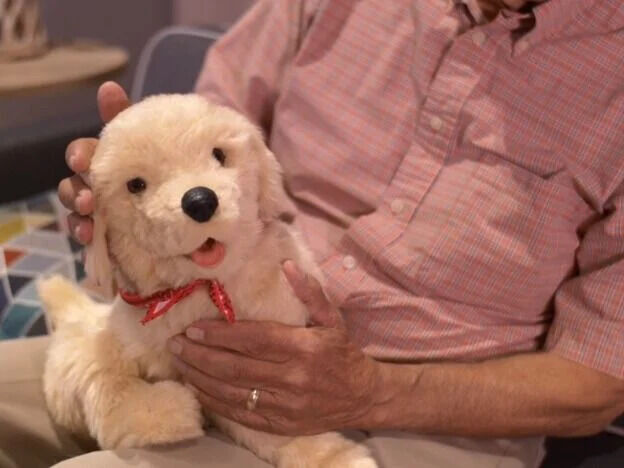This article was republished with permission from WTOP’s news partner InsideNoVa.com. Sign up for InsideNoVa.com’s free email subscription today.

This article was written by WTOP’s news partner InsideNoVa.com and republished with permission. Sign up for InsideNoVa.com’s free email subscription today.
It may look like a dog and it may bark like a dog, but it’s not what you would expect. One organization’s approach to mental health is taking “man’s best friend” to a new level.
Capital Caring Health is leading the way in utilizing modern technology to meet patients’ needs by providing free companion robotic pets to veterans with dementia.
Capital Caring is one of the first and largest nonprofit hospice and palliative care organizations in the country, with its service area spanning across the region from Montgomery and Prince George’s County, Maryland, and Washington, D.C. to Northern Virginia.
The organization focuses on hospice care for those who are terminally ill. Its robotic pet program for veterans, locally, regionally and nationally began in Virginia, with the mission being to help the nearly 1.5 million Vietnam-era veterans suffering from dementia and Alzheimer’s disease.

These artificial companions made their debut in 2015 when the Joy for All innovation team was formed at Hasbro and given the task of leveraging the company’s assets to focus on health and wellness. The team turned its focus to creating products that foster meaningful engagement for the older adult market.
Designed with input from older adults, Joy for All launched the Companion Pet Cats in December 2015 with robotic pets that respond to sight, sound and touch like real pets. Within the first few months, the team noted the significant number of stories and testimonials from caregivers of those with dementia and Alzheimer’s disease on the positive impact on isolation, loneliness and cognitive decline the pets had on their patients and loved ones.
Following the initial success of the robotic cats, the Companion Pet Pup was introduced in 2016 and the brand grew rapidly thereafter. In 2018, the Joy for All team left Hasbro and founded Ageless Innovation to continue the effort.
Two years ago when Capital Caring Health’s chief of philanthropy, marketing and communications Steve Cone started reading the clinical studies done by Ageless Innovation regarding these robotic pets, he realized the benefit the technology could provide to the veteran population and wanted to bring that sort of innovation to Virginia starting with state-run long-term care centers for veterans with dementia which are located in Richmond, Roanoke and Virginia Beach.
“It’s pretty miraculous,” Cone said. “There are plenty of clinical studies that backup what we see personally.”
The results of these artificial companions have had real effects on the veterans. Patient’s personality changes from agitated, confused and angry to happy, joyful and smiling in sometimes only a matter of minutes according to Cone.
“It’s also a great solution for all people with dementia, whether they’re veterans or not. Once they get to mid-term dementia or advanced dementia, they can’t handle a real pet. They can inadvertently harm a real pet. These pets you can throw against the wall, doesn’t matter,” Cone said.
The dogs come in two colors: golden or spotted brown and white. The cats come in tabby, tuxedo and silver while those who prefer birds can choose between a cardinal or a blue bird. The pets respond to sound and touch and by moving their heads and tails and making noises to mimic the ways a real pet would.








